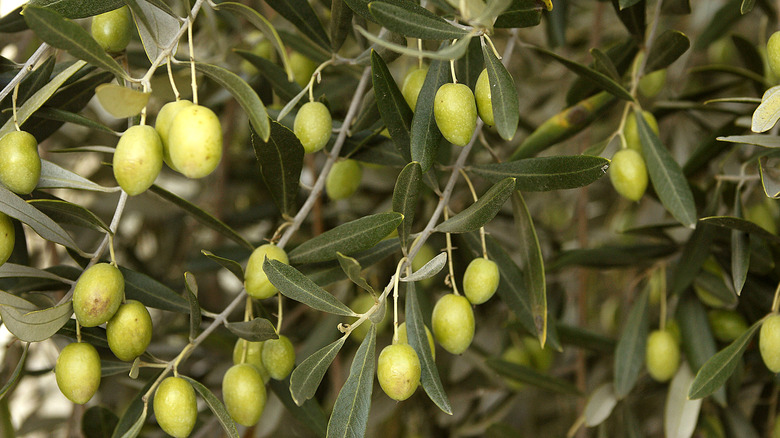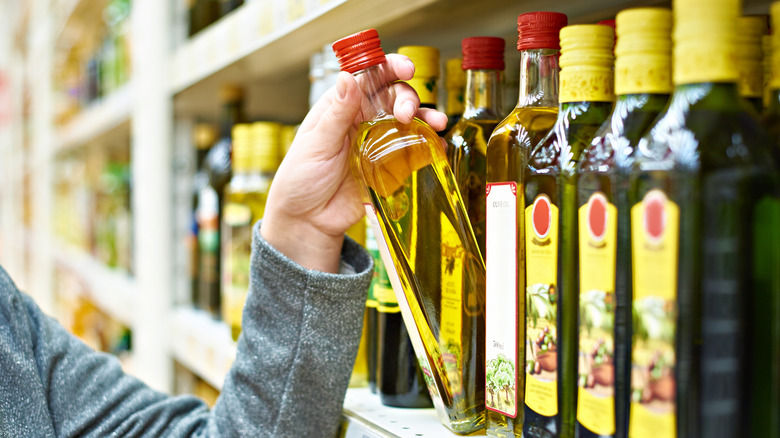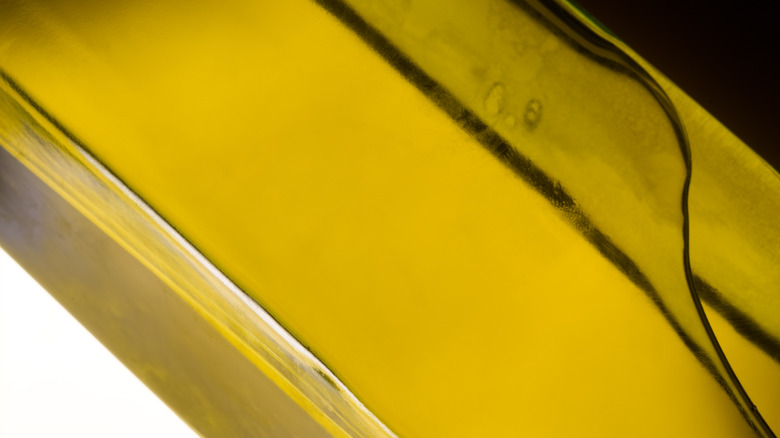The Big Change Coming To Your Bottle Of California Olive Oil
Eataly defines terroir as "taste of place" or "the taste and flavor imparted by the place where a particular food and drink is produced." We may have heard the term thrown about when we talk about wines and cheeses. But "terroir" is hardly used when we talk about olive oil, which many of us regularly use to cook or toss our salads in.
But olive oil has terroir too – and Eataly says a good oil can be judged on qualities like the way it smells, how intense it is flavored, and even how bitter or sweet it happens to be. One might also think of the place in legal terms. Laws that protect California's wines say that in order to be called a "California" wine, all of the grapes used should come from the state, and if it's said to be from an area like Sonoma or Napa, at least 85% of the grapes used must be grown in the area (via Law Offices of Michael Fate). Now the state of California has passed a law that protects its olive oils, too.
California's olive oil bill is meant to protect consumers
The bill, which took effect on the first day of 2022, offers up guidelines on how the word "California" is used in olive oil labels. Under the new law, if a bottle is labeled "'California olive oil' or uses similar words," then 100% of the oil in the bottle should come from olives grown in the state (via California Legislative Information). If the label indicates the oil is from a specific region, then 85% of the olives must be sourced from there. If the olive oil is said to come from an estate, then at least 95% of the olives used to make it should come from that place. Manufacturers who sell a blend made with olives from other places need to clearly indicate what percentage is made with California olives — with the same font size used to spell out the word "California." The law even makes it illegal to own, sell, make or give away imitation olive oil in the state.
The bill's sponsor, Assembly Member Cecilia Aguiar-Curry said it was meant to protect consumers from being misled. "The bill will ensure that consumers know exactly what they are buying, and it will help to support the local farmers who are producing world class oils from olives grown here in our State," she said, adding that "our state's name should not be used as a cynical marketing ploy to give the impression you're buying something you're not" (via Olive Oil Times).
Counterfeit olive oil is a global problem
While the bill has seen some pushback from some of California's olive oil makers, it is not surprising that the legislation was proposed, especially because olive oil producers worldwide assert they have struggled to control counterfeiting. The New York Times has warned that because demand for good olive oil is high, it far outstrips supply. As a result, what we think of as extra virgin olive oil — particularly in the case of Italian olive oil – can actually be blended with the oil of olives from a different country or region than what's indicated, or mixed with other oils like sunflower and canola (though a 2015 study published in the Journal of the American Oil Chemists' Society has found this to be an uncommon occurrence).
Raymond Rodgers, who owns California olive oil producer Corning Olive Oil, doesn't know whether there is a grace period for olive oil producers to comply with the new law because as he sees it, some competitors "[have] already bought a lot of oil that uses some foreign oil. So they should say they got two months to comply or something like that, and then hopefully the California Olive Oil Council will check it" (via KRCR).
Still, Rogers believes the California olive oil law is long overdue: "I think it's a great bill. I think it should have been a long time ago. Kind of like the wine industry, I think it's a good deal."


